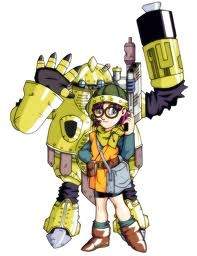Throughout the long history of fiction, androids and gynoids – artificial men and women – have been a common element. When included as tertiary characters they are often symbols for “the other.” When treated as protagonists, they fill the tale with themes of the roles and definitions of humanity. Thus, this series is taking a close look at these artificial people. Today we’re looking at Prometheus.

Prometheus is the mechanical man in the Chrono game franchise, consisting of the classic Chrono Trigger, and its sequel Chrono Cross.
The official canon of Prometheus’s tale is tough to nail down because the game is open ended, and many possible fates are available. Combined with the time-travel, this can cause the player to get any character’s history a bit twisted.
According to the game’s presented back-story, Prometheus was created sometime in the late 20th century as a sort of archival machine.
His creator, another machine called the Mother Brain, knew that a dark age was coming, and so created Prometheus and Atropos, a feminized version of Prometheus who was intended to serve as his companion.
Their mission was to serve humans and observe them, gathering all information they could, so that that information could be preserved in the coming apocalypse.
Prometheus was deactivated during the attack of Lavos – the apocalypse which resulted in the fall of human civilization. It wasn’t until 300 years later, when he was found and repaired by one of the game’s protagonists, that he was again active, and he had completely forgotten his identity or mission, taking the name Robo, and joining the protagonists on their quest.
Potentially that’s the end of his story, though he does develop some in various conversations. However, there are paths the player can take which lend some additional purpose to the character.
First, if the player brings the party to the pre-Lavos era, where they find a corrupted Mother Brain, who wishes to use the information Prometheus has collected to help her destroy the last remaining bits of humanity during the coming dark age, essentially the reverse of her original purpose. Prometheus is forced to combat and defeat Atropos to counter Mother Brain’s plans.
In another option, the player can choose to leave Prometheus in a past era, and pick him up, aged 400 years in a subsequent era. When reunited, he gives the party (and the player) the first clue that some intelligent “Entity” is guiding their actions. This Entity (which turns out later to be the Earth herself) is manipulating them all to create the “ideal” history: a world where everything happens according to a just and right plan. Everything the characters do nudge history about, bending it into a final shape.
The game does not always end with an ideal world, though. The player must perform specific actions correctly to achieve a perfect history. In that ideal world, after the game ends, Prometheus and Atropos – not having been destroyed/deactivated by Lavos – are seen watching over a beautiful future world together.

Prometheus is introspective almost to a fault. He spends most of his dialog (as Robo) wondering why he exists, and lamenting at his lack of purpose, despite the quest he joins.
He is looked down upon by newer robot models, who claim to be more advanced, despite not being constructed as heartily or with as much potential for strength. In this way he serves clearly as an emotional outsider. He also serves as the deducer of the party, having the most intellectual access, and having the most time to think about the issues at hand.
Finally, he’s a symbol for resistance to Fate. In the sequel he becomes part of FATE, the system that goes back in time to rewrite history, but that’s obviously another story.
Prometheus is programmed with a predetermined destiny. He literally has no free will, and is slated to be a part of the destruction of man. He resists this ultimatum however, and helps to destroy his own creator, the one who wrote his destiny. Few literary figures get that chance.
Check back tomorrow, when our featured artificial person will be Maria. If you have an idea for an android or gynoid we could feature, let us know in the comments.






